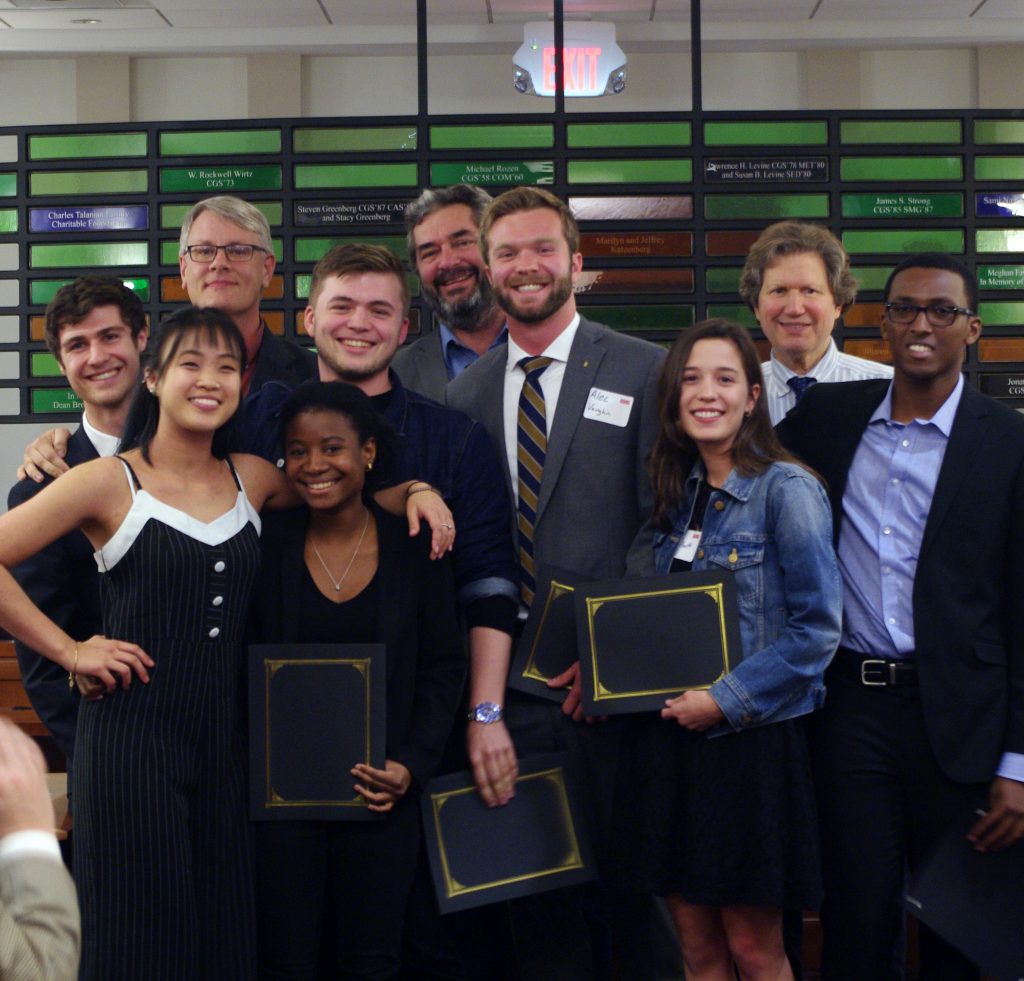Award-Winning Capstone Projects: Meltdown In The Middle East

The Team
Rahim Barrie, Christina Bissereth, Melissa Chan, David McCarthy, Matthew Schaffner, Maria Teresa Talbott, and Alec Vaughn
The Problem
How can we prevent Iran from developing nuclear weapons? Focusing on the question of what the United States should do about the U.S.-Iran nuclear deal of 2015, the students identified deficiencies in the treaty but opposed withdrawing from the deal. The group argued the United States should follow the treaty while increasing economic and sometimes military pressure everywhere else.
Praise from Professors
Having conducted extensive research in authoritative sources, this group presents in detail the specific actions it believes the U.S. should take and the risks and likely benefits of such actions. This Capstone paper is thorough, penetrating, sober, very well- written, and, as a whole, highly commendable.
How They Succeeded
- Maria Teresa Talbott (CGS’18, CAS’20): Teamwork is the reason we succeeded in our Capstone project. Every single member of my group was eager to contribute what they can to the project, and that efficient collective environment was key to our success.
- David McCarthy (CGS’18, CAS’20): We all hand picked all of our teammates so we knew everyone in the project and knew we would be able to work with them. Other things that led to our success was definitely being upfront with each other about when to have meetings, setting goals to achieve during each meeting, and giving out tasks to be completed by each member before the next meeting.
- Alec Vaughn (CGS’18, Pardee’20): Our Capstone succeeded because our team was composed of dedicated and hardworking students who were willing to put their effort and free time into researching the topic and writing the paper.
- Melissa Chan (CGS’18, Pardee ’20): It is crucial to find peers who have the same goals in creating something as in-depth as it is successful, and not just have a team of your best friends. Luckily, my team members were also my friends. Everyone wanted the same thing, and everyone got along well. It’s important to choose a topic that stimulates the most interest among your teammates. Otherwise, it would not make the process as motivating and the final project as exciting.
What They Learned
- Maria: The ability to compromise was something I learned in the process. Arguments about the content and the structure of the project are bound to arise during the process, so it is very important to work as a collective and compromise if necessary.
- David: The most important thing I learned throughout this process was really how important communication is. There were some days where my group mates and I couldn’t meet due to some circumstances, but even during those days we would still communicate in a group chat about what things each member should have completed before the next upcoming meeting and just any overall concerns a group member might have.
- Alec: The most important thing I learned is the ability to be flexible and work with others in what can sometimes be a tense environment. The most important part of group work is making sure that each person’s objectives are understood and met in order to prepare a unified and coordinated product.
- Melissa: I was definitely not a fan of group papers, mainly because it was hard finding my place. But this project was constructive because I gained experience working with several people on an extensive paper.
Any Tips?
- Maria: Do as much of the editing process as you can as a group. It allows for people to explain their work to each other so that crucial information does not get let out of the process because of an editorial miscommunication. It also helps to read out loud with the group present so that nothing gets mixed and you can succeed in making the project into one voice.
- David: I recommend hand picking your group mates so you can hold each member accountable during the process; making a Google calendar with each other to see when people are free during the week in order to make scheduling meetings easier; and holding frequent meetings– even if they are just 30 to 40 minutes long– just to check in with everyone and see potential problems before they escalate.
- Alec: Prepare, prepare, prepare. And success comes with failure along the way. You will end up deleting some work that may seem important but in the end detracts from your work. Make sure you know your goals going in and if they change, be able to adapt quickly. Plan ahead so you have plenty of time to write and research, and always keep an open dialogue with your group about what you are doing.
- Melissa: Plan accordingly. The most important is the beginning: the direction of the paper, the outline, and delegating the parts to each member. My team had a goal to achieve every week, in terms of writing.